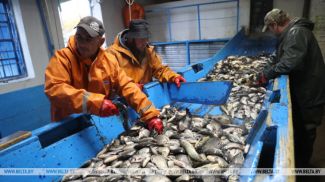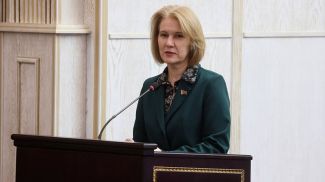MINSK, 29 January (BelTA) – The Action Plan of the Third UNECE Environmental Performance Review (EPR) of Belarus provides for the annual construction of at least 100km of forest roads in the country's forestry sector, BelTA learnt from the UN Public Information Department of Belarus.
The Action Plan rolls out some 80 measures to address the recommendations contained in the Third UNECE Environmental Performance Review (EPR) of Belarus. The adoption of the Action Plan reaffirms the country's strong commitment to the EPR process. Belarus has one of the highest implementation scores among countries participating in the UNECE EPR Programme, with an 84% implementation rate for the recommendations issued in its previous EPR.
The Third EPR highlights a number of achievements of the country, such as a decrease in air pollution from mobile sources, proclamation of new protected areas and Ramsar sites, progress in integrating environmental education and education for sustainable development in formal, non-formal and informal education, and the stability of the institutional framework for environmental protection which has resulted in consistent development and implementation of environmental policies. It also recognizes progress achieved in improving the quality of environmental legislation and in the integration of environmental requirements into sectoral legislation and strategic documents. Among key areas for improvement, the review identifies public participation in strategic planning and the development of legislation, the management of diffuse pollution, the introduction of economic incentives to facilitate the renewal of ageing transport fleet and a reduction in the use of asbestos.
The Action Plan for the period 2016–2020 defines activities and measures to be implemented by 16 central Government bodies, as well as the regional and local authorities. Such measures include further developing the national framework for public participation in environmental decision-making, setting up the national ecological network, optimization of the waste management infrastructure and the introduction of the river sediments monitoring. Many measures go far beyond the environmental area and refer to improvements needed in the energy, transport, forestry, tourism, housing and health sectors to ensure sustainable management of natural resources, preservation of the environment and protection of human health.
For example, in the forestry sector the Action Plan provides for the annual construction of at least 100km of forest roads. Belarus has wide areas that are currently inaccessible due to the wet and boggy parts of the terrain. The average forest road density in the country is 6km per 1,000 hectares of forest, which is low compared with the European average of 20km. Low forest road density can have a negative impact on sustainable management of forests as it can cause overexploitation of forests close to existing roads with associated negative environmental impacts, reduce forest productivity in such areas and increase costs of harvesting in the long term.
Steps are also defined to ensure stronger application of the principles of Shared Environmental Information System (SEIS) by Belarus.
The third EPR of Belarus was conducted during 2015 upon request of the Government of Belarus and in cooperation with the Ministry of Natural Resources and Environmental Protection of Belarus. The UNECE Committee on Environmental Policy approved recommendations of the report on 29 October 2015. The third EPR of Belarus was financially supported by the German Federal Ministry for Environment, Nature Conservation, Building and Nuclear Safety and the German Federal Environment Agency with funds from the Advisory Assistance Programme (AAP) and by the Governments of Norway and Switzerland. The Ministry of Social Affairs, Health and Women's Rights of France delegated an expert on health and environment issues for the review, and the United Nations Environment Programme provided an expert on biodiversity. Organizational support to the review mission was provided by the United Nations Development Programme office in Belarus.
The EPR will be launched in Minsk in spring 2016











